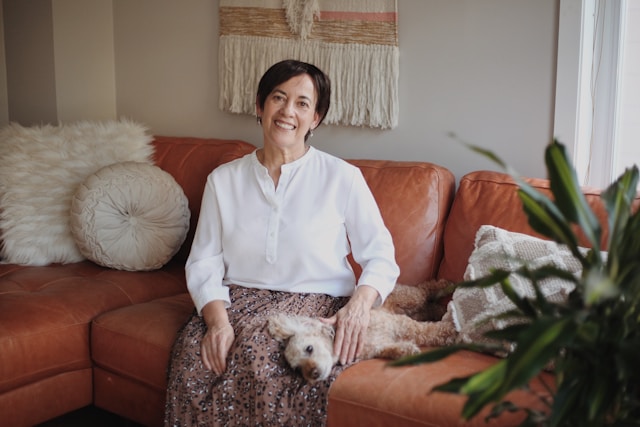Catches your attention, this headline, doesn’t it?
The first time I saw this quote, “Relax, nothing is under control,” I was partly intrigued, partly horrified, and most importantly, greatly relieved. If you’re struggling with coping with uncertainty and feel exhausted by constant attempts to control everything around you, you’re not alone, and there’s a path forward through counseling in Willowbrook and Park Ridge.
It surprised me, this idea that nothing is under control could be relief, but it is. Let’s examine this concept of control and why letting go of it can be so helpful.
Struggling with the need to control everything?
Our therapists in Willowbrook and Park Ridge specialize in helping clients find relief from control-driven anxiety using proven, evidence-based approaches.
Why We Crave Control (And Why It Backfires)
We all need some degree of control over our world. When we have problems, say, our car breaks down at the side of the road, we need to know we can fix that problem, in this case by calling a roadside service, calling a loved one for help, or changing the tire ourself. It’s great to have efficacy, and the idea of not having it is, for all of us, scary. Most of us love predictability and hate change. When things stay the same, we’re good! But when change comes our way, we become afraid and try to feel less anxious and afraid by trying to control things more and more.
It’s understandable this would happen. In American culture in particular, we’re told we can do anything and have it all if we just work hard enough, figure it all out, and overcome that adversity. There’s enormous pressure to appear to others that we’re on top of things and don’t struggle…anything less means we’re somehow not measuring up. Whenever we have a problem or are struggling, we figure we are the problem. We have very little patience for having a hard time and want to make that anxiety go away…So we try harder, work harder, problem solve, and attempt to figure things out until we’re exhausted by all the effort.
It’s just, does that really work? Do our efforts to control really pay off? The answer is an emphatic….sometimes. For example, we can decide that we want to be kind, and be kind. We can realize we feel sluggish and choose to exercise. It’s great that we do have control over some things, and that thing is usually us. But other times, we attempt to control things that are out of control, such as other people and events in our lives.
When Control Becomes a Problem
Regarding our control of people, and I know this is hard to hear, a lot of our upset feelings stem from our own anxieties about them…not always their behavior. We’re anxious and afraid, and we try to control that for ourselves through control. We might check their location on our cell phone a hundred times a day or become overly involved in their lives…and then we have a relationship problem. And we also have an anxiety problem, as anxiety tends to increase the more we focus on the issue, either through our behavior or merely worrying about it a lot.
We can also try to control events, for example, by over planning a dinner party or presentation. The problem is that when the event is over, we have to go through the exact same exhaustive effort as before…and never really resolve our anxiety. We might check the door locks repetitively in an attempt to feel better about possible break-ins, but then we become more preoccupied with them, and our anxiety increases. In these cases, we become trapped in a really unpleasant loop of anxiety > control > wash, rinse, repeat. It’s really hard.
We really escalate our control efforts when things aren’t going our way, such as when we’re facing difficulty in our relationship, a job loss, or illness. Famed author Rabbi Harold Kushner points out that it can feel easier to try to control things, by getting angry at an injustice, exhaustively researching the issue, insisting on change, than it is to recognize that many things are out of our hands. Letting go of the illusion of control can be so scary that we are unwilling to even look at that possibility.
The Mental Loop: When Thinking Becomes Control
Strangely, we exert control not only through our behaviors but also in the way that we think. Have you ever had a problem that you just kept thinking about, worrying about, and analyzing….and all that happened was, your anxiety just kept going up and you couldn’t find the solution you were looking for? We often think, “If I just think about this some more, I will find a solution and then I’ll feel better!” Sometimes that may work, but many times what we think is problem solving is actually worry and an attempt to control our own anxiety.
Our highly evolved, thinking brains aren’t helping us these days. We can literally spend all of our time in our heads trying to control our thoughts, “problem solve,” “figure it out,” thinking we’ll then feel better, but meanwhile we’re missing what’s going on outside our heads, in our actual life.
The Cost of Control
It’s worth asking ourselves, What impact are these control efforts having on me? Some likely answers are:
- Increased fear and never-ending anxiety
- Overfixation on the problem, not enjoying life
- Never-ending loops of exhausting effort
- Anger and upset feelings when things don’t go our way
- Impaired relationships
- No serenity due to lack of acceptance that problems are a part of life
Do you recognize, perhaps, that the more you’ve tried to control things, either in your head or through your behavior, the more you’ve lost your peace of mind, and that you haven’t solved the problem?
How Therapy in Willowbrook Helps You Cope with Uncertainty
This is where professional support can make all the difference. At Life Counseling Institute, our therapists in Willowbrook and Park Ridge specialize in helping clients navigate the profound discomfort that comes with letting go of control. Through evidence-based approaches like Cognitive Behavioral Therapy (CBT) and Acceptance and Commitment Therapy (ACT), we help you develop new ways of relating to uncertainty.
In counseling, we help you:
- Identify your specific control patterns – Understanding where and how you try to exert control is the first step
- Explore the roots of your need for control – Often tied to early experiences of unpredictability or lack of safety
- Learn distress tolerance skills – Building your capacity to sit with discomfort without needing to fix it immediately
- Practice acceptance – Not passive resignation, but active acknowledgment of what is
- Reconnect with your values – Shifting focus from what you can control to what matters most to you
Brynne Dochterman, Licensed Professional Counselor (LPC), who specializes in attachment-based therapy for anxiety, explains the deeper roots of control-driven anxiety:
“The deep fear of a loss of control usually connects back to early attachment experiences. True emotional regulation is not about forcing control, but learning to tolerate and soothe the distress of not having it.”
Through her work using an attachment lens and interpersonal neurobiology, Brynne helps clients understand that their need to control everything often stems from early experiences where their environment felt unpredictable or unsafe. By addressing these attachment wounds, clients can develop genuine emotional regulation skills rather than relying on exhausting control strategies.
Research published in BMC Psychiatry shows that intolerance of uncertainty is a key factor maintaining generalized anxiety disorder. In a study of over 2,000 adults, individuals with high intolerance of uncertainty reported significantly elevated symptoms of anxiety and depression, while those with low intolerance of uncertainty maintained stable, low symptom levels throughout periods of high uncertainty (Andrews et al., 2023).
Finding Relief: Learning to Let Go
Let’s reexamine our quote, then: Relax, Nothing is under control. To me, it’s a relief to realize that I can stop with the exhaustive effort, recognize that just because I’m struggling it doesn’t mean I’ve done something wrong…and let go of control.
It reminds me of the Serenity Prayer, “God, grant me the serenity to accept the things I cannot change, the courage to change the things I can, and the wisdom to know the difference.” Often, I find that I’m trying to change things I can’t, before it’s time, or before I’m ready…either through my actions I take or overthinking things.
Wouldn’t it be better to be at peace in the face of a problem, to be accepting of it, rather than always rallying against it, likely in futile ways? We may not be able to find answers in the timeline we had in our head, and that’s okay. We can exercise our “letting go” muscles and wait for the answers to appear.
Through therapy, many of our clients in the northwest and western Chicago suburbs discover that the relief they’ve been seeking doesn’t come from finally getting everything under control, it comes from giving up that impossible goal. This shift often feels uncomfortable at first, but it ultimately creates space for genuine peace and presence in your life.
Practical Steps Toward Acceptance
While therapy provides the structured support and personalized guidance you need, there are some practices you can begin exploring on your own:
- Notice Your Control Attempts – Simply becoming aware of when you’re trying to control the uncontrollable is powerful. Pay attention to when you’re checking, planning excessively, seeking reassurance, or ruminating.
- Question the Cost – Ask yourself, “What is this control effort costing me?” Often, the price we pay in anxiety, time, and relationships far exceeds any benefit.
- Practice Mindfulness – Learning to be present with what is, rather than what you wish it were, builds your tolerance for uncertainty. Mindfulness-based approaches can help you observe anxious thoughts without being controlled by them.
- Start Small – You don’t have to give up all control efforts at once. Choose one small area where you can practice letting go and see what happens.
- Seek Support – Working with a therapist trained in anxiety treatment makes this process much more manageable. Our team at Life Counseling Institute has helped hundreds of clients learn to live with uncertainty.
In short, It’s a relief to learn to relax, nothing is under control.
Frequently Asked Questions
How do I know if my need for control is actually a problem?
If your control efforts are causing you significant distress, taking up large amounts of time, interfering with relationships, or not actually solving the problems you’re trying to fix, it may be time to seek support. Many people struggling with generalized anxiety disorder or obsessive-compulsive tendencies experience this pattern. Counseling can help you distinguish between healthy agency and unhealthy control patterns.
Can therapy really help me feel comfortable with uncertainty?
Yes. While you may never love uncertainty, therapy can significantly increase your tolerance for it. Through evidence-based approaches like CBT and ACT, you learn skills to manage the distress that uncertainty brings, rather than trying to eliminate all uncertainty from your life (which is impossible). Research has shown that cognitive-behavioral therapy is highly effective for generalized anxiety disorder. A comprehensive review of CBT for anxiety disorders found that CBT resulted in better long-term outcomes compared to other treatments, with patients showing improved functioning even at 12-month follow-up (Kaczkurkin & Foa, 2015).
How long does it take to change control patterns?
This varies by individual, but many clients begin noticing shifts within 8-12 sessions of focused therapy. The patterns often developed over years or even decades, so changing them takes intentional practice. Your therapist will work with you to develop realistic expectations and track your progress. At Life Counseling Institute, we use evidence-based methods that have been shown to create meaningful change within a reasonable timeframe.
What if I’m afraid that letting go of control will make things worse?
This is one of the most common fears people have when beginning this work, and it makes complete sense. Your control efforts have been your way of trying to protect yourself and manage anxiety. In therapy, we don’t ask you to simply abandon all control at once. Instead, we work together to help you experiment with letting go in small, safe ways. You’ll discover through experience that loosening your grip on control doesn’t lead to catastrophe, it actually reduces your anxiety and opens up your life. We go at your pace and build your tolerance gradually.
Is acceptance the same as giving up or not caring?
Not at all. Acceptance is often misunderstood as passive resignation, but it’s actually an active process. Acceptance means acknowledging reality as it is right now, without adding layers of resistance, judgment, or struggle. From this place of acceptance, you can make clearer, more effective choices about what action to take (if any). Giving up means you stop caring and disengage from life; acceptance means you stop fighting reality and engage more fully with what is. This distinction is central to ACT therapy and often creates profound relief for clients.
Ready to Find Peace with Uncertainty?
Ready to Get Counseling for Anxiety?
If you’re exhausted by the constant effort to control everything, our team at Life Counseling Institute in Willowbrook and Park Ridge is here to help. We offer both in-person and telehealth counseling throughout Illinois.
You Might Also Find It Helpful To Read:
- Worry is an Active Process: How Counseling for Anxiety Can Help You Break the Cycle
- Managing Your Anxiety by Becoming AWARE
- Does Talking About Your Anxiety Help, or Hurt?
Citations:
Andrews, J. L., Li, M., Minihan, S., et al. (2023). The effect of intolerance of uncertainty on anxiety and depression, and their symptom networks, during the COVID-19 pandemic. BMC Psychiatry, 23, 261. https://doi.org/10.1186/s12888-023-04734-8
Kaczkurkin, A. N., & Foa, E. B. (2015). Cognitive-behavioral therapy for anxiety disorders: An update on the empirical evidence. Dialogues in Clinical Neuroscience, 17(3), 337-346. https://doi.org/10.31887/DCNS.2015.17.3/akaczkurkin







